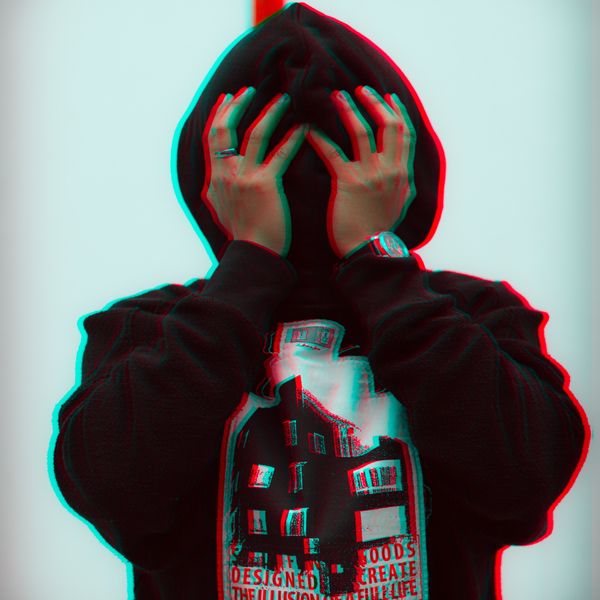Author Redefines Their Gender Identity After Reading Marie Kondo's Book

Marie Kondo has been in the news quite a bit recently, with many people debating the usefulness of her method for decreasing clutter.
Kondo's method, KonMari, has resulted in some other unintended side effects, but the effect it had for author Sandy Allen had surprisingly little to do with excess "stuff."
The KonMari Method, according to Marie Kondo's website, is:
"A state of mind – and a way of life – that encourages cherishing the things that spark joy in one's life. Belongings are acknowledged for their service – and thanked before being let go, should they no longer spark joy."
Sandy recently wrote an essay, which was published by them., in which they describe the slow process of how removing the clutter from their life brought about a realization of who they really were.
Allen originally picked up a copy of Kondo's book The Life-Changing Magic of Tidying Up in an attempt to help their boyfriend, Rob.
While he wasn't an overly untidy person, Sandy was very organized and there was one spot that needed tending.
They wrote:
"Our courtship had been a steady reclamation of his less-tidy space by my relentless wave of tidiness. (Whatever's going on in Marie Kondo's brain that makes her say "I love mess!", I have it, too.) His nightstand, though, was The Place He Put Things. A place I ached to clean."
After unsuccessful attempts to get Rob to read the book, Sandy decided to lead by example.
They started with the closet; as they went through all of their clothes and determined whether they brought joy, there was a clear pattern that emerged.
They recalled:
"I didn't take me long to see it, what the discard pile was. It was only the skirts, only the dresses, only the flowers and lace and sparkles. It was everything I'd bought hoping that some colleague might say: Isn't that cute?"
"I burst into tears, shame filling me entirely, and then I laughed about the fact that this book had made me cry, this silly, stupid cleaning book."
Allen described having an internal list of moments that hinted that they weren't satisfied with playing the ultra-feminine role, moments that they couldn't let themself fully acknowledge for fear of what that would mean.
One of these moments was from a work Halloween party.
They explained:
"One Halloween, I'd come as Ace Ventura."
"After lunch they were giving prizes to those who'd really gone above and beyond costume-wise, myself not included. I stood in the crowd next to a colleague who'd come dressed as her boss."
"Earlier her costume had gotten a big reaction, though, because it was her dressing as him: sneakers, jeans, glasses, of course the hoodie. Everyone laughed. Now we were standing around, drinking booze, eating sugar. I told her I liked her costume and she looked embarrassed."
"'I feel so awkward. Don't you feel awkward?' she asked."
"I didn't get what she meant."
"'Dressing like a guy!' she said."
"'Oh,' I said, and without thinking added: 'I always dress like a guy for Halloween, or at least a lot of the time.'"
"'That's funny,' I said to my colleague, 'I haven't noticed that before.'"
Here's a photo they shared of their favorite Halloween costume ever. Sandy is on the left.
It wasn't until they started working from home that things started to become clearer.
They said:
"Now with no office to go to, I rarely dressed, and if I did I wore sweatpants. The days I did go out, for an appointment or a meeting, I might force myself to dress up. Tripping down a cobblestone street one afternoon in heels, I wondered who the hell I was trying to fool."
After running into someone they knew while donating the last of their dresses and heels, Allen had a realization.
"I didn't say to him, nor could I have articulated, that I was throwing out the last of me pretending to be a woman."
"Walking away, I felt joy, an almost ridiculous joy. I also felt terror, like when a cartoon has walked off a cliff and is standing blissfully on air."
Rob was supportive of Sandy through their journey to self-discovery, acknowledging their struggles and providing loving support.
After a clothes shopping trip that was an ordeal in and of itself, the two went on a date.
"That evening, we went on a date. I wore a new button down, trousers, Oxfords. We moved down the street, his hand in mine, which was shaking, so terrified by the question of what we must look like to others."
"Before that night, I realized, I had never before been both 'dressed up' and comfortable."
Allen goes on to describe the various ways that this paradigm shift, which started with the simple act of sorting their wardrobe, has changed their life.
The way others react to them has changed significantly as they present in a more gender neutral fashion.
"Sometimes people think I'm male at first and then realize I'm not, usually when I talk, and sometimes I then see a wild anger in them."
"In those moments, I feel my vulnerability. Though in other senses I feel safer; I am no longer constantly catcalled, as I was before — that drumbeat of male violence, muffled. All the time I feel how arbitrary these categories are. All the time, I know this is all just about power."
"Some who see me now are excited about my apparent difference. In a restaurant, a waitress ran over, grinning, nearly shouting, "'What are you?'"
"The best feelings are the converse of this cisgender othering: the moments of communion, however brief, I share with other queer and trans people out there in the world."
The essay's reception on Twitter was overwhelmingly positive.
This article sparked so much joy: https://t.co/BWgdOg8eIR— zo (@zo) 1551216381
This made my day. https://t.co/7VFGMiP2mb— Dr. Nour Halabi (@Dr. Nour Halabi) 1551212054
I finally read this essay from @sealln and it's just so very, very good https://t.co/ZACfpGJznT— Hayes Brown (@Hayes Brown) 1551383073
Never has an article made me so emotional. As someone still understanding their gender identity, I often feel alon… https://t.co/T9oskQ7nLw— Beet (@Beet) 1551298408
Quite a few people have expressed having had a similar experience to Allen's.

@HayesBrown @sealln I have had a very similar experience. I don't have much else to say other than "oh yeah this ha… https://t.co/QPYDfnRz6H— Everett (@Everett) 1551384050
A few Instagram users commented that Allen's essay helped them to articulate their own "gender stuff."


Clothes are an integral part of how people express themselves.
Maybe taking a hard look at what you actually wear and and enjoy and what you hold on to because you think you should, could give excellent insight into who you are as a person.
If you want to learn more about KonMari, Marie Kondo's book, The Life-Changing Magic of Tidying Up, is available here.
Kondo's follow-up, Spark Joy: An Illustrated Master Class on the Art of Organizing and Tidying Up (The Life Changing Magic of Tidying Up) is also available here.
People Reveal The Weirdest Thing About Themselves
Reddit user Isitjustmedownhere asked: 'Give an example; how weird are you really?'

Let's get one thing straight: no one is normal. We're all weird in our own ways, and that is actually normal.
Of course, that doesn't mean we don't all have that one strange trait or quirk that outweighs all the other weirdness we possess.
For me, it's the fact that I'm almost 30 years old, and I still have an imaginary friend. Her name is Sarah, she has red hair and green eyes, and I strongly believe that, since I lived in India when I created her and there were no actual people with red hair around, she was based on Daphne Blake from Scooby-Doo.
I also didn't know the name Sarah when I created her, so that came later. I know she's not really there, hence the term 'imaginary friend,' but she's kind of always been around. We all have conversations in our heads; mine are with Sarah. She keeps me on task and efficient.
My mom thinks I'm crazy that I still have an imaginary friend, and writing about her like this makes me think I may actually be crazy, but I don't mind. As I said, we're all weird, and we all have that one trait that outweighs all the other weirdness.
Redditors know this all too well and are eager to share their weird traits.
It all started when Redditor Isitjustmedownhere asked:
"Give an example; how weird are you really?"
Monsters Under My Bed
"My bed doesn't touch any wall."
"Edit: I guess i should clarify im not rich."
– Practical_Eye_3600
"Gosh the monsters can get you from any angle then."
– bikergirlr7
"At first I thought this was a flex on how big your bedroom is, but then I realized you're just a psycho 😁"
– zenOFiniquity8
Can You See Why?
"I bought one of those super-powerful fans to dry a basement carpet. Afterwards, I realized that it can point straight up and that it would be amazing to use on myself post-shower. Now I squeegee my body with my hands, step out of the shower and get blasted by a wide jet of room-temp air. I barely use my towel at all. Wife thinks I'm weird."
– KingBooRadley
Remember
"In 1990 when I was 8 years old and bored on a field trip, I saw a black Oldsmobile Cutlass driving down the street on a hot day to where you could see that mirage like distortion from the heat on the road. I took a “snapshot” by blinking my eyes and told myself “I wonder how long I can remember this image” ….well."
– AquamarineCheetah
"Even before smartphones, I always take "snapshots" by blinking my eyes hoping I'll remember every detail so I can draw it when I get home. Unfortunately, I may have taken so much snapshots that I can no longer remember every detail I want to draw."
"Makes me think my "memory is full.""
– Reasonable-Pirate902
Same, Same
"I have eaten the same lunch every day for the past 4 years and I'm not bored yet."
– OhhGoood
"How f**king big was this lunch when you started?"
– notmyrealnam3
Not Sure Who Was Weirder
"Had a line cook that worked for us for 6 months never said much. My sous chef once told him with no context, "Baw wit da baw daw bang daw bang diggy diggy." The guy smiled, left, and never came back."
– Frostygrunt
Imagination
"I pace around my house for hours listening to music imagining that I have done all the things I simply lack the brain capacity to do, or in some really bizarre scenarios, I can really get immersed in these imaginations sometimes I don't know if this is some form of schizophrenia or what."
– RandomSharinganUser
"I do the same exact thing, sometimes for hours. When I was young it would be a ridiculous amount of time and many years later it’s sort of trickled off into almost nothing (almost). It’s weird but I just thought it’s how my brain processes sh*t."
– Kolkeia
If Only
"Even as an adult I still think that if you are in a car that goes over a cliff; and right as you are about to hit the ground if you jump up you can avoid the damage and will land safely. I know I'm wrong. You shut up. I'm not crying."
– ShotCompetition2593
Pet Food
"As a kid I would snack on my dog's Milkbones."
– drummerskillit
"Haha, I have a clear memory of myself doing this as well. I was around 3 y/o. Needless to say no one was supervising me."
– Isitjustmedownhere
"When I was younger, one of my responsibilities was to feed the pet fish every day. Instead, I would hide under the futon in the spare bedroom and eat the fish food."
– -GateKeep-
My Favorite Subject
"I'm autistic and have always had a thing for insects. My neurotypical best friend and I used to hang out at this local bar to talk to girls, back in the late 90s. One time he claimed that my tendency to circle conversations back to insects was hurting my game. The next time we went to that bar (with a few other friends), he turned and said sternly "No talking about bugs. Or space, or statistics or other bullsh*t but mainly no bugs." I felt like he was losing his mind over nothing."
"It was summer, the bar had its windows open. Our group hit it off with a group of young ladies, We were all chatting and having a good time. I was talking to one of these girls, my buddy was behind her facing away from me talking to a few other people."
"A cloudless sulphur flies in and lands on little thing that holds coasters."
"Cue Jordan Peele sweating gif."
"The girl notices my tension, and asks if I am looking at the leaf. "Actually, that's a lepidoptera called..." I looked at the back of my friend's head, he wasn't looking, "I mean a butterfly..." I poked it and it spread its wings the girl says "oh that's a BUG?!" and I still remember my friend turning around slowly to look at me with chastisement. The ONE thing he told me not to do."
"I was 21, and was completely not aware that I already had a rep for being an oddball. It got worse from there."
– Phormicidae
*Teeth Chatter*
"I bite ice cream sometimes."
– RedditbOiiiiiiiiii
"That's how I am with popsicles. My wife shudders every single time."
– monobarreller
Never Speak Of This
"I put ice in my milk."
– GTFOakaFOD
"You should keep that kind of thing to yourself. Even when asked."
– We-R-Doomed
"There's some disturbing sh*t in this thread, but this one takes the cake."
– RatonaMuffin
More Than Super Hearing
"I can hear the television while it's on mute."
– Tira13e
"What does it say to you, child?"
– Mama_Skip
Yikes!
"I put mustard on my omelettes."
– Deleted User
"Oh."
– NotCrustOr-filling
Evened Up
"Whenever I say a word and feel like I used a half of my mouth more than the other half, I have to even it out by saying the word again using the other half of my mouth more. If I don't do it correctly, that can go on forever until I feel it's ok."
"I do it silently so I don't creep people out."
– LesPaltaX
"That sounds like a symptom of OCD (I have it myself). Some people with OCD feel like certain actions have to be balanced (like counting or making sure physical movements are even). You should find a therapist who specializes in OCD, because they can help you."
– MoonlightKayla
I totally have the same need for things to be balanced! Guess I'm weird and a little OCD!

Experiencing death is a fascinating and frightening idea.
Who doesn't want to know what is waiting for us on the other side?
But so many of us want to know and then come back and live a little longer.
It would be so great to be sure there is something else.
But the whole dying part is not that great, so we'll have to rely on other people's accounts.
Redditor AlaskaStiletto wanted to hear from everyone who has returned to life, so they asked:
"Redditors who have 'died' and come back to life, what did you see?"
Sensations
 Happy Good Vibes GIF by Major League SoccerGiphy
Happy Good Vibes GIF by Major League SoccerGiphy"My dad's heart stopped when he had a heart attack and he had to be brought back to life. He kept the paper copy of the heart monitor which shows he flatlined. He said he felt an overwhelming sensation of peace, like nothing he had felt before."
PeachesnPain
Recovery
"I had surgical complications in 2010 that caused a great deal of blood loss. As a result, I had extremely low blood pressure and could barely stay awake. I remember feeling like I was surrounded by loved ones who had passed. They were in a circle around me and I knew they were there to guide me onwards. I told them I was not ready to go because my kids needed me and I came back."
"My nurse later said she was afraid she’d find me dead every time she came into the room."
"It took months, and blood transfusions, but I recovered."
good_golly99
Take Me Back
"Overwhelming peace and happiness. A bright airy and floating feeling. I live a very stressful life. Imagine finding out the person you have had a crush on reveals they have the same feelings for you and then you win the lotto later that day - that was the feeling I had."
"I never feared death afterward and am relieved when I hear of people dying after suffering from an illness."
rayrayrayray
Free
 The Light Minnie GIF by (G)I-DLEGiphy
The Light Minnie GIF by (G)I-DLEGiphy"I had a heart surgery with near-death experience, for me at least (well the possibility that those effects are caused by morphine is also there) I just saw black and nothing else but it was warm and I had such inner peace, its weird as I sometimes still think about it and wish this feeling of being so light and free again."
TooReDTooHigh
This is why I hate surgery.
You just never know.
Shocked
 Giphy
Giphy"More of a near-death experience. I was electrocuted. I felt like I was in a deep hole looking straight up in the sky. My life flashed before me. Felt sad for my family, but I had a deep sense of peace."
Admirable_Buyer6528
The SOB
"Nursing in the ICU, we’ve had people try to die on us many times during the years, some successfully. One guy stood out to me. His heart stopped. We called a code, are working on him, and suddenly he comes to. We hadn’t vented him yet, so he was able to talk, and he started screaming, 'Don’t let them take me, don’t let them take me, they are coming,' he was scared and yelling."
"Then he yelled a little more, as we tried to calm him down, he screamed, 'No, No,' and gestured towards the end of the bed, and died again. We didn’t get him back. It was seriously creepy. We called his son to tell him the news, and the son said basically, 'Good, he was an SOB.'”
1-cupcake-at-a-time
Colors
"My sister died and said it was extremely peaceful. She said it was very loud like a train station and lots of talking and she was stuck in this area that was like a curtain with lots of beautiful colors (colors that you don’t see in real life according to her) a man told her 'He was sorry, but she had to go back as it wasn’t her time.'"
Hannah_LL7
"I had a really similar experience except I was in an endless garden with flowers that were colors I had never seen before. It was quiet and peaceful and a woman in a dress looked at me, shook her head, and just said 'Not yet.' As I was coming back, it was extremely loud, like everyone in the world was trying to talk all at once. It was all very disorienting but it changed my perspective on life!"
huntokarrr
The Fog
"I was in a gray fog with a girl who looked a lot like a young version of my grandmother (who was still alive) but dressed like a pioneer in the 1800s she didn't say anything but kept pulling me towards an opening in the wall. I kept refusing to go because I was so tired."
"I finally got tired of her nagging and went and that's when I came to. I had bled out during a c-section and my heart could not beat without blood. They had to deliver the baby and sew up the bleeders. refill me with blood before they could restart my heart so, like, at least 12 minutes gone."
Fluffy-Hotel-5184
Through the Walls
"My spouse was dead for a couple of minutes one miserable night. She maintains that she saw nothing, but only heard people talking about her like through a wall. The only thing she remembers for absolute certain was begging an ER nurse that she didn't want to die."
"She's quite alive and well today."
Hot-Refrigerator6583
Well let's all be happy to be alive.
It seems to be all we have.
People Explain Which Overly Hyped Foods They Just Don't Understand

We all have our favorite foods, food preferences, and even foods that we don't like.
But there are some popular foods out there that just don't make sense. Nonetheless, we keep seeing them advertised, included in movies and TV shows, and of course, our loved ones ordering them while we look on in confusion.
Curious about others' food preferences, Redditor YarnSpectre asked:
"What's one food everyone seems to go crazy for, but you just don't understand the hype?"
So Much Sugar
"Nutella. It’s just okay."
- Former-Finnish-4653
"Way too sweet for me, I’d probably love it with one-fifth of the sugar."
"Unfortunately that's true of a lot of desserts, though. Most would benefit from a cut of at least 25 percent of the sugar."
- Mindful-O-Melancholy
Not-So-Chocolate Cake
"Red velvet cake. I've had ones that were supposed to be excellent but it's just red cake."
- dedmuse22
"Most red velvet cakes are just s**tty vanilla cake with red food coloring. Get one (or make one) the correct way with non-Dutch-processed cocoa powder, buttermilk, and vinegar. It's an incredibly smooth, very different type of chocolate cake."
- whiskeyclone630
Mastery Makes a Difference
"Those multicolored cookie things that everyone was making into cakes or something for a while? Macaroons? Macarons? I don't think I've ever had one that tasted good. They're pretty, but that's it."
- TensionShift9576
"Macarons. I never cared for them either."
"I had one yesterday at a potluck, homemade ones. They were seriously something else, with some sort of butter cream and jelly inside. Never had anything quite like it. Now I wish I had grabbed a few to take home."
"I still won't eat store-bought ones, though."
- Totally-A-Banana
The Wrong Kind of Spice
"Hot Cheetos or Takis. Anything with the artificially colored spicy powder."
- jadziasonrie
"Takis texture is my issue. They’re like semi-stale rolled-up Doritos."
- addvalue2222
The Sugar Cookies of the Midwest
"Those dry-a** Walmart sugar cookies."
- ComiNotub
"They taste like play-dough cookies came to life."
- Significant_Potato29
For Garnish
"I mean, people go crazy in both directions, but cilantro. There’s the whole 'does it taste like soap or not' thing, but it’s usually presented as 'people either think it tastes like soap or they find it amazing.'"
"I am neither. It doesn’t taste like soap to me, but I also don’t love it. Meh."
- Whiteums
"I don't think it tastes like soap, but I do think it tastes weirdly metallic. I don't go out of my way to avoid it in pre-prepared food, but I usually leave it out of things I'm preparing myself."
- caffeinated-tea
Fancy Decor Only
"People like how fondant LOOKS. I refuse to believe a single soul wants to EAT it."
- sorandom21
"It's like eating a candied raincoat."
- BlueShirtGuy
Back for a Limited Time
"Every time it comes back, I’m SUPER excited for the McRib at McDonald's. I bite into one and then… the spongey texture hits me and makes me remember why I don’t need to buy it ever again."
"Then, somehow, McRib season rolls around again two years later, and there I am in line…"
- the_yellow_jello
"I'm convinced this is why they only bring it out every once in a while. Nobody actually likes it, but they wait just long enough for you to forget that it's no good and then hit you with a combo of nostalgia and 'limited time only' FOMO (Fear of Missing Out)."
- FiveAlarmFrancis
A Seasonal Tradition
"Pumpkin spice. It’s fine, but absolutely not anything to make a fuss about."
- AdMaterial9419
"There is a car parts place in a small town I drive through to visit family, and last year on their reader board, they had: 'THEYRE BACK! PUMPKIN SPICE BRAKE PADS.'"
"And now I can never see anything pumpkin spice and not think about it, might have been my favorite reader board sign ever."
- deadcomefebruary
Pure Caffeine Addiction
"Energy drinks like Red Bull or Monster."
- DishIntelligent5645
"I'm an avid Monster drinker, but I totally get it. I'm always trying new and interesting energy drinks I see, but so much of it is just garbage."
"The white Monster tastes like 90s Fresca to me and is the only energy drink I love."
- broniesnstuff
Overly-Complicated Drinks
"Can it be a beverage? Because I kind of hate IPAs but everyone else seems to love them. And I like beer, just not IPAs."
- AngelOvTeOdd
"I have nothing against people who want complex beers. It's just not for me. I want an easy as f**k to drink fizzy yellow beer for when it's hot out. And a nice smooth stout for all other times. When I want more complex flavors, I'll go for wine or scotch."
- I_will_be_me_Arsenal
Just Too Expensive
"What about lobster? I can dig it with drawn butter and I ain’t mad at it. But f**k me if I’m gonna pay $29.99 for a lobster. I’d rather eat shrimp."
- nosaj23e
Questionable Value
"Truffles. I paid $60 this weekend at an Italian restaurant for eight slivers on my pasta shaved in front of me. I barely tasted anything. I don't get the hype."
- heybuddy
Improved Gut Health?
"Kombucha."
- Tiny_Wasabi2476
"Ah, yes, dirty pond water."
- meteorguy
Rich Tastes
"Caviar."
- malYca
"Everyone goes crazy for caviar? Most people seem to dislike it."
"Though admittedly, people who do like it tend to like it a lot."
"That all being said, I really don't like it, either."
- Heathen_Mushroom
When it comes to food, to each their own, but it was interesting to see some undeniable fan favorites like pumpkin spice hit this list.
It just serves as a great reminder for a larger picture idea: Don't be unkind about the things that might bring someone else joy.
Trying to lose weight is a struggle understood by many people regardless of size.
The goal of reaching a healthy weight may seem unattainable, but with diet and exercise, it can pay off through persistence and discipline.
Seeing the pounds gradually drop off can also be a great motivator and incentivize people to stay the course.
Those who've achieved their respective weight goals shared their experiences when Redditor apprenti8455 asked:
"People who lost a lot of weight, what surprises you the most now?"
Redditors didn't see these coming.
Shiver Me Timbers
"I’m always cold now!"
– Telrom_1
"I had a coworker lose over 130 pounds five or six years ago. I’ve never seen him without a jacket on since."
– r7ndom
"140 lbs lost here starting just before COVID, I feel like that little old lady that's always cold, damn this top comment was on point lmao."
– mr_remy
Drawing Concern
"I lost 100 pounds over a year and a half but since I’m old(70’s) it seems few people comment on it because (I think) they think I’m wasting away from some terminal illness."
– dee-fondy
"Congrats on the weight loss! It’s honestly a real accomplishment 🙂"
"Working in oncology, I can never comment on someone’s weight loss unless I specifically know it was on purpose, regardless of their age. I think it kind of ruffles feathers at times, but like I don’t want to congratulate someone for having cancer or something. It’s a weird place to be in."
– LizardofDeath
Unleashing Insults
"I remember when I lost the first big chunk of weight (around 50 lbs) it was like it gave some people license to talk sh*t about the 'old' me. Old coworkers, friends, made a lot of not just negative, but harsh comments about what I used to look like. One person I met after the big loss saw a picture of me prior and said, 'Wow, we wouldn’t even be friends!'”
"It wasn’t extremely common, but I was a little alarmed by some of the attention. My weight has been up and down since then, but every time I gain a little it gets me a little down thinking about those things people said."
– alanamablamaspama
Not Everything Goes After Losing Weight
"The loose skin is a bit unexpected."
– KeltarCentauri
"I haven’t experienced it myself, but surgery to remove skin takes a long time to recover. Longer than bariatric surgery and usually isn’t covered by insurance unless you have both."
– KatMagic1977
"It definitely does take a long time to recover. My Dad dropped a little over 200 pounds a few years back and decided to go through with skin removal surgery to deal with the excess. His procedure was extensive, as in he had skin taken from just about every part of his body excluding his head, and he went through hell for weeks in recovery, and he was bedridden for a lot of it."
– Jaew96
These Redditors shared their pleasantly surprising experiences.
Shopping
"I can buy clothes in any store I want."
– WaySavvyD
"When I lost weight I was dying to go find cute, smaller clothes and I really struggled. As someone who had always been restricted to one or two stores that catered to plus-sized clothing, a full mall of shops with items in my size was daunting. Too many options and not enough knowledge of brands that were good vs cheap. I usually went home pretty frustrated."
– ganache98012
No More Symptoms
"Lost about 80 pounds in the past year and a half, biggest thing that I’ve noticed that I haven’t seen mentioned on here yet is my acid reflux and heartburn are basically gone. I used to be popping tums every couple hours and now they just sit in the medicine cabinet collecting dust."
– colleennicole93
Expanding Capabilities
"I'm all for not judging people by their appearance and I recognise that there are unhealthy, unachievable beauty standards, but one thing that is undeniable is that I can just do stuff now. Just stamina and flexibility alone are worth it, appearance is tertiary at best."
– Ramblonius
People Change Their Tune
"How much nicer people are to you."
"My feet weren't 'wide' they were 'fat.'"
– LiZZygsu
"Have to agree. Lost 220 lbs, people make eye contact and hold open doors and stuff"
"And on the foot thing, I also lost a full shoe size numerically and also wear regular width now 😅"
– awholedamngarden
It's gonna take some getting used to.
Bones Everywhere
"Having bones. Collarbones, wrist bones, knee bones, hip bones, ribs. I have so many bones sticking out everywhere and it’s weird as hell."
– Princess-Pancake-97
"I noticed the shadow of my ribs the other day and it threw me, there’s a whole skeleton in here."
– bekastrange
Knee Pillow
"Right?! And they’re so … pointy! Now I get why people sleep with pillows between their legs - the knee bones laying on top of each other (side sleeper here) is weird and jarring."
– snic2030
"I lost only 40 pounds within the last year or so. I’m struggling to relate to most of these comments as I feel like I just 'slimmed down' rather than dropped a ton. But wow, the pillow between the knees at night. YES! I can relate to this. I think a lot of my weight was in my thighs. I never needed to do this up until recently."
– Strongbad23
More Mobility
"I’ve lost 100 lbs since 2020. It’s a collection of little things that surprise me. For at least 10 years I couldn’t put on socks, or tie my shoes. I couldn’t bend over and pick something up. I couldn’t climb a ladder to fix something. Simple things like that I can do now that fascinate me."
"Edit: Some additional little things are sitting in a chair with arms, sitting in a booth in a restaurant, being able to shop in a normal store AND not needing to buy the biggest size there, being able to easily wipe my butt, and looking down and being able to see my penis."
– dma1965
People making significant changes, whether for mental or physical health, can surely find a newfound perspective on life.
But they can also discover different issues they never saw coming.
That being said, overcoming any challenge in life is laudable, especially if it leads to gaining confidence and ditching insecurities.












